The best comedy movies to stream now on Hulu
New release Self Reliance, along with classics like Beetlejuice and The Full Monty, are just some of the funniest movies available on Hulu now
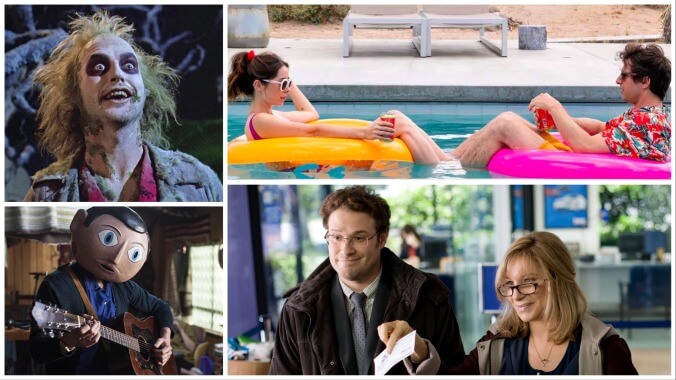
Hulu is a great resource for viewers seeking laughs, as this round-up of the platform’s best available comedy movies can attest. The A.V. Club’s list particularly proves that Hulu has a few subgenre specialties among their comedic offerings: there’s plenty of romance, from 2 Days In Paris to Palm Springs; films featuring plucky ladies like Support The Girls and Wild Rose; and surprisingly solid directing debuts, like Jake Johnson’s Self Reliance. Keep an eye on this and our chronicle of Hulu’s overall best films as we continue to update them—minimize the uncertainty of browsing and let us do the curating work for you!
This list was updated on May 18, 2023.
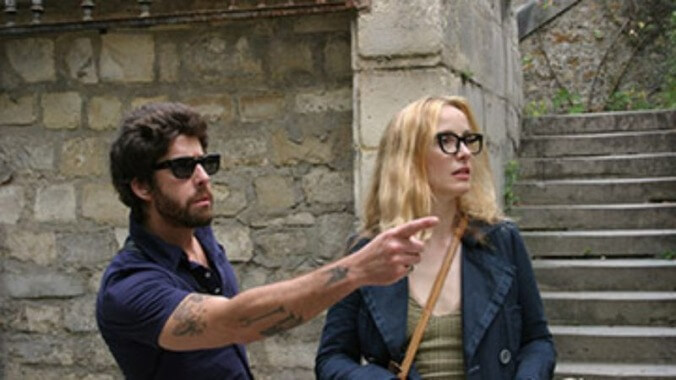
On paper, Julie Delpy’s 2 Days In Paris might well read like a light French farce, full of wacky characters and playful relationship banter that only turns serious toward the end of the film. The reality is much more raw. Playing a thirtysomething couple making a brief stopover in Paris after a vacation to Italy, Delpy (Before Sunrise) and co-star Adam Goldberg snipe at each other with casual venom, refusing to acknowledge or accede to each other’s calls for comfort or reassurance. When he says she’s special, she shoots back “Like in the retarded way, which is why I’m going out with you.” When she gives him more information than he wants about something, he says “It’s like dating public television.” They both seem a little neurotic and a little self-centered, but mostly, after two years together, they’ve apparently run out of reasons to be kind. And while their give-and-take is almost playful, both actors put an uncomfortable edge on it, fit to keep viewers squirming with alternate waves of sympathy and disgust. []
It’s hard to believe that a movie as defiantly odd as the horror-comedy Beetlejuice even got made by a Hollywood studio in the ‘80s, let alone that it became a substantial hit and a sleepover staple. The title character—a pasty-faced, hollow-eyed, green-teethed, bug-chomping corpse played by Michael Keaton—doesn’t make his first full appearance until halfway through the movie, and then comes roaring across the screen like a pop-eyed beast from a Tex Avery cartoon, belching and swearing and boasting. Chief among those boasts: that he can help recently deceased couple Alec Baldwin and Geena Davis scare away the hideous New York yuppies now inhabiting their charming country house. (Yes, Beetlejuice is pro-ghost.) Dry in tone, packed with grotesque sight gags, and surprisingly sweet at times, Beetlejuice never seems concerned with straightforward storytelling. First and foremost, it’s a funhouse ride. []
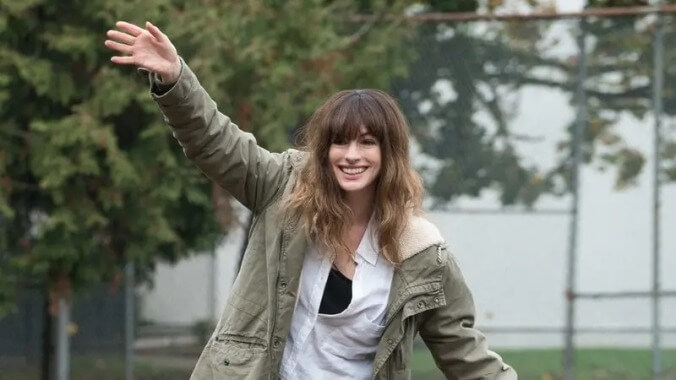
Colossal’s early April release date all but eliminated star Anne Hathaway from the 2017 awards-season conversation, which is a shame because she turns in a witty, sympathetic performance as Gloria, a self-destructive alcoholic who discovers that she has a psychic connection to the giant monster who started ravaging Seoul right around the time she moved back home in disgrace. At first, this high-concept sci-fi drama appears to be pushing a straightforward (and rather obvious) metaphor for alcoholism. But by the surprisingly moving final scene, Nacho Vigalondo, who wrote as well as directed the film, deftly pivots it into a much more interesting statement about toxic masculinity, as well as a character study of a woman taking back her life from the forces, both internal and external, that want to tear her down. []
It doesn’t take long for , Joel Kim Booster’s instant-classic Jane Austen riff, to stake its claim in the romantic comedy canon—or rather, defiantly outside of it. Less than a minute into the opening sequence, Booster refers to Pride And Prejudice, his source material, as “hetero nonsense.” As this story’s Lizzie Bennet stand-in, gay Brooklynite Noah continues to narrate: he shudders at the “boyfriend energy” of the naked man in his bed whose name clearly eludes him, then calls his chosen family, the group of friends on their annual Fire Island vacation, the F-word (the one reserved for gays). “Don’t cancel me,” he tells us, tongue firmly in cheek. “I’m reclaiming it!”Suffice it to say this isn’t your typical rom-com—but then again, how could it be? With all due respect to and rather less respect to Love, Simon, queer audiences haven’t seen themselves reflected much in a genre that, at least in its heyday, defined Hollywood’s mainstream and reinforced heteronormative sociocultural standards. Booster and director Andrew Ahn use Austen’s tale of class tension, a romantic comedy urtext, to laugh in the face of such standards, and introduce some new ones. Queer and straight viewers alike may experience with a mix of delight and disorientation; they haven’t worked the muscles of watching a gay will-they-won’t-they story, let alone one populated by unabashedly out characters. []
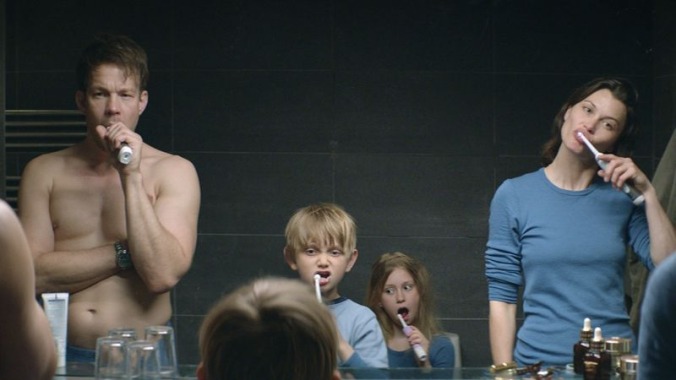
For a fleeting moment, one could reasonably mistake Force Majeure for a disaster movie. Certainly, its characters might wonder, through their panic and fear, if they’ve somehow stumbled into one. The pivotal scene arrives early, on the second day of a blissful family vacation. Seated for a relaxing lunch on the terrace of a French ski resort, married Swedish parents Tomas (Johannes Kuhnke) and Ebba (Lisa Loven Kongsli) are alarmed by the rapid approach of snow, tumbling down the adjacent slope in their general direction. As the wall of white seems to close in on them, expanding outward with menacing speed, Thomas makes an instinctual flee for safety, completely abandoning Ebba and their two young children. The avalanche, as it turns out, is controlled; what looks like certain doom is just a false alarm, a dramatic billow of powder. But as the smoke clears, so too does any illusion Ebba might have held about Tomas and his paternal instincts. There’s no going back from such a flagrant act of self-preservation, however involuntary it might have been. []
What chutzpah it takes to hire one of the world’s most recognizable movie stars and then render him completely unrecognizable. With his deadpan indie comedy Frank, director Lenny Abrahamson does just that, hiding the often-photographed face of Michael Fassbender behind a giant papier-mâché mask. Fassbender plays the title character, a cult musician who never removes his bulbous, custom-made stage head, even to sleep or shower. Is Frank seriously committed to his shtick, or should he just be committed? The truth is closer to the latter than the former, but when the man performs—gyrating with country-preacher conviction, spewing stream-of-consciousness poetry in a rich baritone—the fine line separating madness from genius blurs. For a while, Frank seems like a one-joke movie, its humor derived solely from the tension between a meek careerist and the reclusive eccentrics barely tolerating his existence. Eventually, however, Frank deepens into something more meaningful, in part, because its empathy shifts from the “hero” to the enigmatic artist whose coattails he rides. []
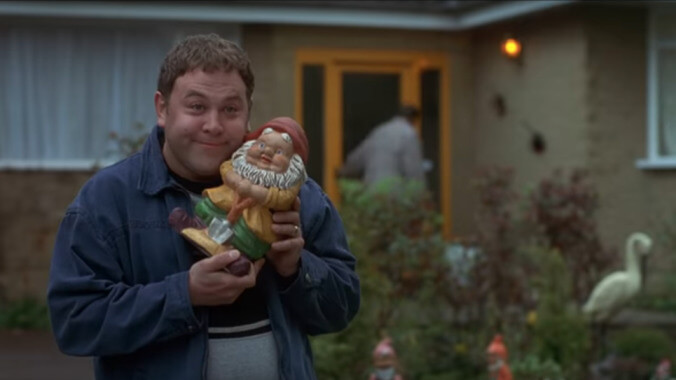
Robert Carlyle (Trainspotting) stars as a laid-off Sheffield steelworker who devises an unusual scheme to better himself in this boisterous new comedy. Inspired by the popularity of a Chippendales appearance, Carlyle begins recruiting other unemployed men to form their own stripshow. That none of them, for various reasons, are really qualified to be taking off their clothes in public is the source for much of The Full Monty’s humor—most often in the form of some very funny physical gags—but the film has much more going for it than that one obvious joke would suggest. The Full Monty takes a harsh look at the state of post-Thatcher labor in Britain, portraying some of the humiliation involved with life on the dole. Carlyle’s attempts to win the respect of his young son, and some of the other men’s insecurity with their bodies—a rarely touched topic—are treated sensitively and incorporated seamlessly into the story. []

The Guilt Trip is casually astute and clever about the way even sane, responsible adults revert back to being prickly children when confronted with the gale-force wind of a parent’s intense, misguided attention. But while Streisand and Rogen’s relationship is smartly, affectionately drawn, just about every other element of the movie feels perfunctory, from the hooey about Streisand’s lost love to the flat, uninspired direction of / helmer Anne Fletcher. The film’s end credits feature Rogen and Streisand riffing off each other in ostensibly improvised outtakes that are far funnier and livelier than anything in the movie, hinting at the better comedy that might have ensued had the filmmakers trusted their leads’ chemistry and chops more, rather than watering them down with schmaltz and shtick, wacky eating contests, contrived plotting, and a horribly hokey happy ending. []
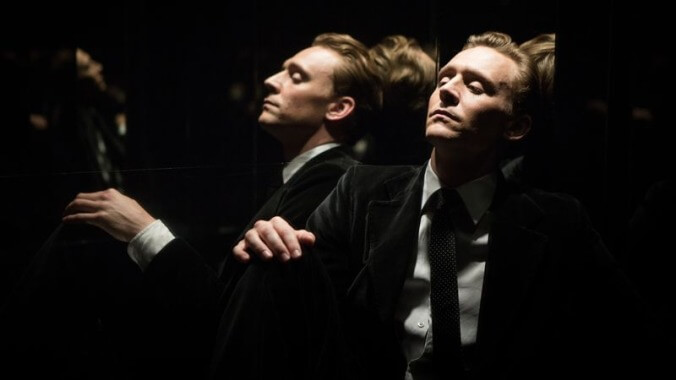
High-Rise, a darkly funny adaptation by cult English director Ben Wheatley (, ) of the J.G. Ballard novel of the same title, preserves the book’s ’70s setting, steeping its vision of a toppling society in retro decadence. Dr. Laing (Tom Hiddleston, very good), a bachelor physiologist from apartment 2505, watches as the titular building regresses into a Mad Max-esque wasteland of garbage barricades, raiding parties, and literal class warfare following a few blackouts and a problem with the trash chute—a descent into collective madness that High-Rise underplays and elides to surreal (and audience-defying) effect. Wheatley’s use of ellipses and his overall refusal to do anything that might suggest a point of view or invite identification skirt incoherence. As in Ballard’s novel, the building isn’t just a dystopian microcosm of alienation and stratification, with the wealthiest living at the top. It also seems to create a new reality of its own: a killer cocktail of claustrophobia, stylishness, and oblique irony. []
Horrible Bosses succeeds almost entirely on the chemistry of its three leads, who remain likeable even while resorting to homicide. The serviceable-at-best direction and screenplay mainly serve to facilitate improv and a handful of scatological setpieces, but the acting more than compensates for the film’s other failings. Jason Bateman proves, as always, an ideal straight man, while Jason Sudeikis more or less recycles his glibly appealing turn as Owen Wilson’s horndog sidekick in , but Horrible Bosses belongs to Day. In the film’s funniest scene, a coked-up Charlie Day rocks out to The Ting Tings’ “That’s Not My Name” in a car in a state of ecstatic frenzy. It’s a virtuoso solo turn from a wild-card actor who excels in groups of three, and a potent illustration of how a brilliant character actor with a spark of madness can elevate a ramshackle lowbrow farce into a solid mainstream comedy through sheer force of charisma. []
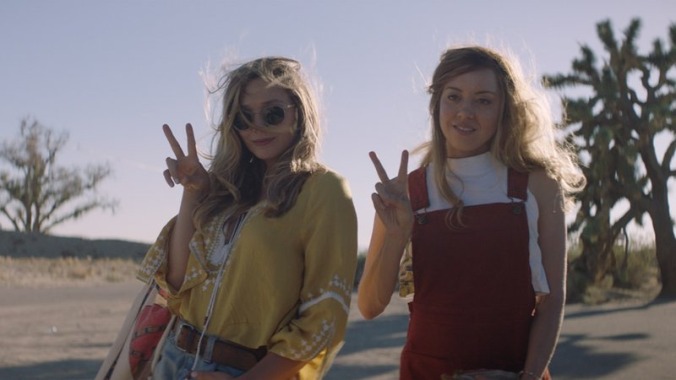
Ingrid Goes West begins in media res, as Ingrid Thorburn (Aubry Plaza), her face stained with tears and her long dress covered with a dirty oversize sweatshirt, barges into a wedding to pepper-spray the bride, a woman we later find out she barely even knows. After a brief detour to the mental hospital, Ingrid is back home and back to her routine of stuffing limp convenience-store food into her mouth while obsessively scrolling through Instagram in her pajamas. Ingrid’s M.O. is mistaking social media likes for actual human connection—something she sorely lacks—and so it doesn’t take long for her to zero in on a new obsession, faux-hemian “influencer” Taylor Sloane (Elizabeth Olsen). An innocent reply to a comment on Instagram later and Ingrid has cashed in her modest inheritance to move to L.A. and obsessively remake herself in Taylor’s image. This all happens within the first 10 minutes of the film, which devotes much of its running time to skewering the pretentious unpretentiousness of Taylor and her bearded and boat-shoe-clad husband, Ezra (Wyatt Russell). The cast is uniformly strong, although Plaza does a lot of the dirty work as the desperate Ingrid, whose unnerving smile suggests that she could fall back into psychosis at any moment. []
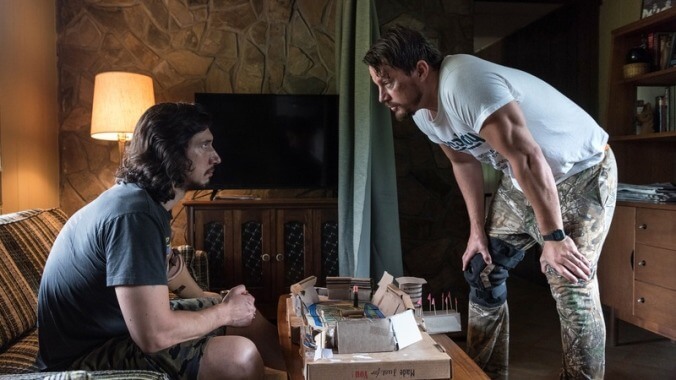
As a heist picture, Logan Lucky knows just how often to alternate straight exposition with cagey withholding. The full robbery blueprint is revealed slowly—new details are still twisting the narrative even after the big heist day has passed, perfect for Steven Soderbergh’s control-freak tendencies (once again, he shoots and edits himself). The snappy script by unknown (and possibly pseudonymous) newcomer Rebecca Blunt offers some Coen brothers-like dialogue, which Soderbergh complements with his compositions. Sometimes he gets a laugh just by how he positions the actors in the frame, and there are multiple gags predicated on the timing of explosions. []
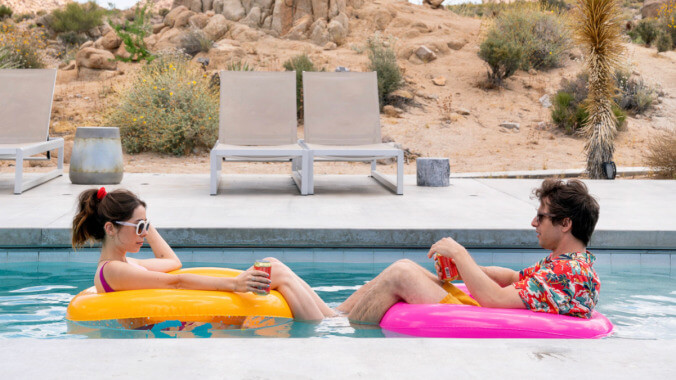
Andy Samberg stars as Nyles, a slacker doofus stuck at a destination wedding in Southern California, which he’s attending as the date of a bridesmaid. Blithely wandering the reception in a loud and very informal short-sleeve shirt, Nyles clearly doesn’t have any fucks to give. But he also seems to have a suspiciously premonitory sense of how the night will play out. And before long, Palm Springs reveals the reason for both: He’s stuck in a time warp, waking up every morning to find himself still in Palm Springs on the morning of the wedding. The film employs its magical conceit as a multi-purpose metaphor for a long-term relationship. The flip side, of course, is that monogamy can leave you feeling as stuck as the characters, living the same day over and over again, with only your significant other for company. But Palm Springs wears all that baggage lightly. It’s a sadly rare thing: a sweet, madly inventive, totally mainstream romantic comedy, buoyed by inspired jolts of comic violence (some of them provided by J.K. Simmons as another wedding guest with a very big bone to pick with Nyles). []
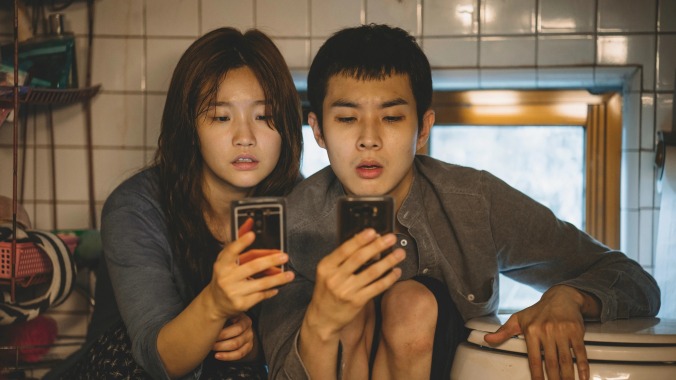
The last time Bong Joon Ho made a parable of class warfare, he set it aboard one hell of a moving metaphor: a train looping endlessly around a frozen Earth, its passengers divided into cars based on wealth and status, upward mobility achieved only through lateral revolution. Parasite, the South Korean director’s demented and ingenious new movie, doesn’t boast quite as sensational a setting; it takes place mostly within a chicly modern suburban home, all high ceilings, stainless steel countertops, and windows instead of walls, advertising the elegant interior decoration within. But there’s a clear class hierarchy at play here, too; it runs top to bottom instead of front to back, vertically instead of horizontally. And though we’re watching a kind of warped upstairs-downstairs story, not a dystopian arcade brawler, Parasite races forward with the same locomotive speed as , with plenty of its own twists and turns waiting behind each new door. []
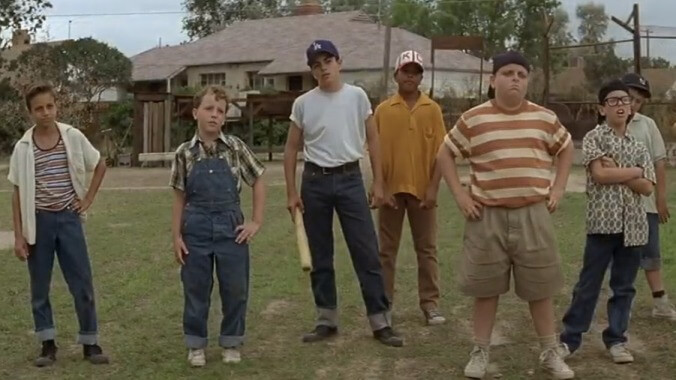
The Sandlot, with its coming-of-age and sports-movie clichés, broke molds when it was released in April 1993. went the route, centering the film on a young cast but setting it in an era more familiar to the parents in the audience. The movie sounds downright trite when distilled down to one sentence: An uncoordinated indoor kid learns to love baseball and make friends in the summer of 1962. A more detailed description would note that the uncoordinated kid accidentally loses his stepdad’s baseball signed by Babe Ruth, and he and his new pals spend most of the film attempting to recover the ball in between first kisses and “not too much, but some” trouble. As much as The Sandlot replays familiar tropes, the movie succeeds in part because it embraces the magical realism that remolds all our childhood memories into the lore we pass on to the next generation: the baseball the neighbor kid hit that never touched the ground; the scary house around the corner with the dog the size of a lion; hell, at one point . The Sandlot treats these surreal moments with all the seriousness of a fifth-grader—which is to say, it fully believes the myth. []
In an interview with , director, writer, and star Jake Johnson described his film like this:“Self-Reliance has a wilder tone. It’s comedic, there’s an adventure, there’s a love story, and it’s a thriller. It’s all in 90 minutes. It’s meant to be manic. I want you to be scared when you’re scared, but I also want you to laugh when you’re scared. I think it’s okay if two people have different reactions as long as you’ve enjoyed the ride. I didn’t want to debate with another director about the tone, which was so clear to me.”
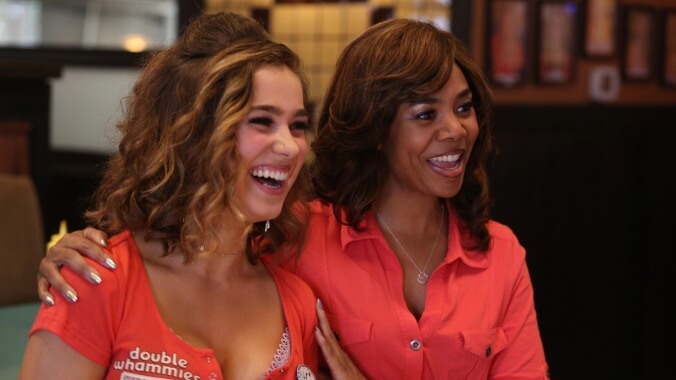
So many movies perform grotesque contortions (or extraordinary acts of denial) to avoid showing their characters at work, at least if their jobs aren’t cop, lawyer, or secret agent. And who can blame them, really? A lot of work is a soul-crushing slog, something that Support The Girls understands intuitively—so intuitively that writer-director Andrew Bujalski doesn’t need to sink his characters into a swamp of misery to acknowledge the drudgery of working at Double Whammies, sort of a poor man’s Hooters in the Texas suburbs. Applying a one-crazy-day structure to a day that isn’t all that crazy, Bujalski follows Lisa (Regina Hall), the restaurant’s manager, as she plays boss, dutiful employee, counselor, and mother, depending on which crisis she’s addressing. Hall, in exactly the kind of performance that’s too grounded and true to receive the awards attention it deserves, shows deft command of the subtle differences between our various selves—work, family, uncomfortable fusions of the two—that so many working people are forced to navigate. Yet for all of its dead-end realism, this is also a warm and funny movie, with boundlessly charming supporting turns from Haley Lu Richardson, Shayna McHayle, and Dylan Gelula. Workplace drudgery doesn’t preclude glimmers of humanity—and humanity doesn’t guarantee a happy ending, as the movie’s perfectly open final shots indicate. []
 Keep scrolling for more great stories.
Keep scrolling for more great stories.
